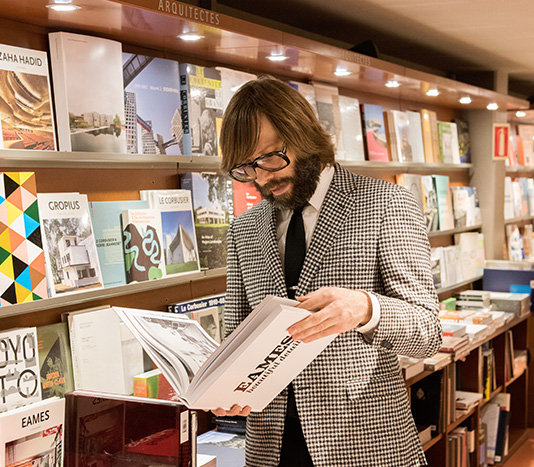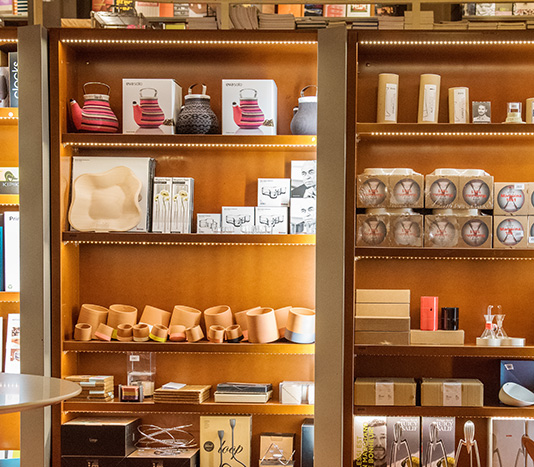
- Posted at 24/11/2017
- in News
Òscar Dalmau is the geek presenter of TV. He studied audiovisual communication and currently, apart from giving his face to the screen, he is one of the television scriptwriters and will dio m be prol ifics. He decided to cultivate his rarity for his own benefit and that of everyone. He describes his professional activity as making people laugh from a blank sheet of paper. What he doesn't say is that he doesn't care about the context, the lloc. He adapts because for him there is only the here and now. This is what pushes him to live stories chasing objects and to discover himself in human beings who lead him to his destination enjoying the journey. In his case, the goal is actually a consequence.
On May 18 you have the opportunity to listen, see and hear Òscar Dalmau in his best version in La Capell on the occasion of the cycle of conferences Object of Desire. Òscar will be the moderator between two generations of designers and two national design awards: André Ricard, awarded in 1987, and Mario Ruiz, in 2016. This ser the first of a series of conferences led by Òscar Dalmau and which will bring together references and the main players in the current design scene.
We sit at a table in the La Capell store . They are about to open their doors to the public. The recorder is ja running. A cordial greeting and then a whisper that says it all in alta voice: "Ask me easy questions, si please...". I answer him by jumping to reach a l height of his sense of humor and I tell him to give me concrete answers. Connecting with a single sentence is one of the skills she hides behind her long bangs and her endless and immaculate glasses. She explains that her studied look is to disguise her lack of beauty, but I doubt it. It seems to me that it is to hide the speed at which he thinks, which is almost instantaneous. Òscar Dalmau communicates with everything: his sharp verb, his agile grammatical constructions, his gaze, his gestures,... And also with his emotion, which appears quan talks about what for him is a passion: design and La Capell.
On and quan did your interest in design come about?
It all started ar with the covers of jazz records from the fifties and sixties in the Blue Note catalog. I was amazed by the black and white covers, by the letters and their fonts, by the way the m were dressed... As a result of those covers I began ar to be interested in the graphic design of the time. And then for fashion design. I discovered furniture design, then industrial design, interior design and architecture. All very concentrated in the fifties, sixties and early seventies.
And this interest in design led you to La Capell
At the end of 2012, I was preparing the presentation of the TV3 Marathon against cancer with my colleague Ariadna Oltra and one afternoon when we were preparing the script we met to visit her father's printing house, which is very close to the Cathedral. QUAN we returned home we passed in front of the College of Architects and we were dazzled by the window of the bookstore, full of designer furniture, which I m love. I suggested that Ariadna go in and, once dins, they told us that we didn si want to look at m books downstairs there was a very large bookstore. We went down and freaked out because it was a space we didn't know. I became a member, and since then I have discovered very interesting books, architects and works that are among the shelves of La Capell.
What do those who don't know design miss?
Quality of life. Resounding.
 |  |
Let's go back to your tastes.
Jo find that there is m pleasure looking for treasures from other times than in anything else you can find today at the level of m use. For example, discovering an elapé from the sixties instead of buying the latest one by David Bisbal. It's too much cil. I'm very furot in this sense. Unintentionally, everything takes me back to that time.
I once read the following sentence: tastes are prejudices and vice versa.
I can ser. I'm very obsessive about it. It is not rational. I tend to think that m is modern m't simply interested in the fet of modern ser , although sometimes I am surprised. For example, I moved heaven and earth to find someone who could give me a clue to a design by Jordi Vilanova that had won a Delta award. It is a very simple wooden stool. I was obsessed because I have a two-year-old daughter and I wanted her to learn to sit in some moble that had history. In the end, through social networks I contacted his family and they gave me one of the two stools they had. M greatly enriches this great cie of gymkhana and the journey to get things done.
 |  |
And what did you learn?
That people appreciate that you value what many people leave aside today just because it is old. And I am grateful t because my daughter has learned to sit and stand on a stool made m is half a century ago. Behind its design there is a person who has thought, who has built t, who has destroyed t and has rebuilt until he wins a prize. There will be people who think I invested a lot of hours; It actually ser a month, but I'm well satisfied. I remember a phrase Miguel Milá told me about the use of solar energy, which he ser pioneer 40 years ago. M explained that his friends told him that he spent a lot of money heating the water with solar panels, and he told them that yes, that he paid m is for the water but that the satisfaction of showering with water that he had heated in the sun was a pleasure that was priceless. Something similar happens to me with these searches. It is a difficult pleasure cil to explain.
What is the relationship of human beings with objects?
It is a amor-odi relationship. Contact is cada time m is virtual, and I speak for myself too. Before the phone appeared m jo I was walking down the street looking at everything, taking an interest in everything, touching everything. And I continue to do it, but less, even though, for example, in a restaurant, si m like the dish, I take it and turn it over (before they put the soup on me, of course...).
This restlessness to look, seek and grasp... This curiosity... Does on come from?
As for the furniture, maybe because my father was a cabinetmaker. He always told me: "Fuster no.... cabinetmaker". Although the furniture my father worked with has nothing to do with the ones m like. My grandfather was also a cabinetmaker. I try not to lose my curiosity. It is a spirit that must be worked on.
The path is m is important than the destination.
Walking these paths I have met people I would not have met otherwise.
For you, what is creating?
I've never created objects, but my work is creative. M sit in front of a blank sheet of paper with the almost civil servant obligation to make people laugh. For me, creating is thinking about making a smile, which is a very difficult pleasure cil describe. Sometimes you think it will work and it doesn't, and other times the other way around.
The exceptional André Ricard says that in design, the tica is a consequence not an end. Perfection in function usually produces beautiful shapes.
Yes, without a doubt. It's perfection. There are many well-finished objects that have something wrong.
Continuing with the ideas of this design referent, he calls these useless objects "pol objectual illusion".
Jo I think there must be useless design to value useful design. And jo that I dedicate myself to writing humor, I find that in bad design there is an inexhaustible source of humor. For example, in the films of Jacques Tati, who is confronted with automatic kitchens. fet, jo quan I go to a public toilet I write down in a notebook what is there: a tap with a photoelectric cell that you don't know how it goes, an air conditioner that t'dries your hands and that stops working cada two by three, an automatic light tica that goes out at the worst time, etc. With this sixth rie of situations I laugh. I remember an exhibition that was held many years ago at the Palau de la Virreina on poorly designed objects. There was a public bench that was jammed in the rain, a clock on you could watch TV, but in which they broadcast a film with subtitles and it was impossible to read the subtitles, a public address system that distorted the voice and was absolutely unintelligible... I admit it. I'm a case.





